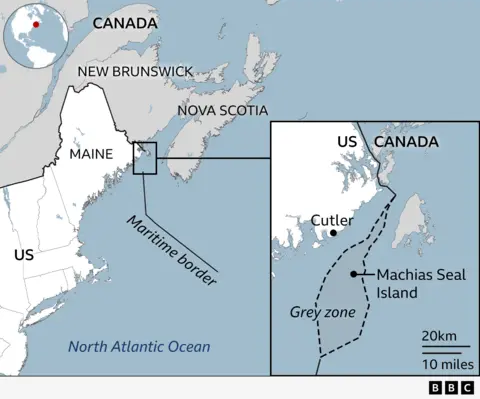
The Growing Tensions Between The U.S. And Canada Over The Grey Zone
In recent months, a long-standing territorial dispute between the United States and Canada over Machias Seal Island, located in the turbulent waters of the Gulf of Maine, has escalated into an alarming source of contention. This tiny, uninhabited rock, which lies in a region referred to as the "Grey Zone," has implications that extend far beyond local lobster fishing rights, hinting at broader geopolitical shifts. The perilous dance between the two allies raises questions about the future of their relationship amid an uncertain political climate.

The Grey Zone has been embroiled in a dispute since the 1700s, with both nations claiming rights to the territory and its surrounding waters, which are rich with valuable lobster stocks. John Drouin, a lobsterman from Cutler, Maine, offers a vivid portrayal of the chaos that ensues each summer as fishermen from both sides rush to set traps, often leading to dangerous encounters. "People have literally lost parts of their bodies," he recounts, highlighting the extreme lengths to which fishermen will go to secure their livelihoods within this contested area.
The U.S. and Canada have operated under a surprisingly peaceful coexistence despite their contested claims, thanks to a shared ruling by an international court in 1984 that allowed both nations to fish these waters. However, recent rhetoric from U.S. President Donald Trump, who has suggested that Canada might be more beneficial as the 51st state, has elevated tensions to a new level. The implications of his remarks resonate deeply, as they could signal a shift in U.S. policy towards its northern neighbor.

As Trump’s administration continues to impose steep tariffs on Canadian imports and toy with territorial ambitions, Canadian leaders express concerns that such designs could jeopardize decades of amicable U.S.-Canada relations. Prime Minister Mark Carney recently cautioned that these provocations might lead to a complete collapse of the Canadian economy—an overture that would ultimately facilitate U.S. control over Canada’s vast natural resources.
Critics and political analysts are closely watching the developments in the Grey Zone and across the U.S.-Canada border, speculating on the potential impacts on trade, border security, and regional diplomacy. Both nations have historical precedents of conflict, as earlier territorial disputes and conflicts; however, a conflict today would present complex challenges in an age of heightened global interdependence.
Amid stark political posturing, one question looms: What does the future hold for the U.S.-Canada relationship? The echoes of rivalry are palpable, yet many observers hope for a return to the cooperative spirit that characterized their past interactions. As both sides wrestle with uncertainty, residents, particularly those who rely on fishing in the Grey Zone, wait anxiously to see how their livelihoods will be affected.
We invite readers to share their thoughts on the future of U.S.-Canada relations. Do you believe that this ongoing dispute over Machias Seal Island will lead to greater tensions or pave the way for renewed collaboration? Your opinions matter as we navigate the complexities of these international relations.